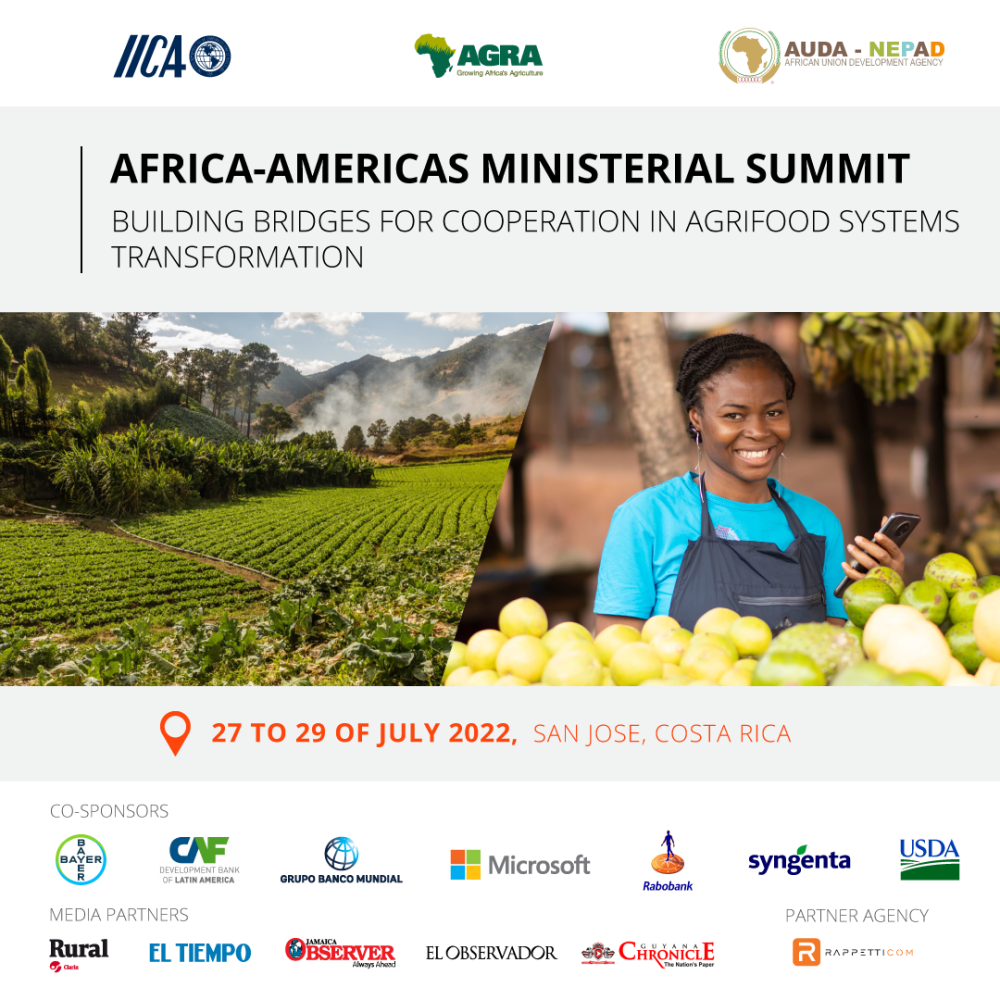The institutions and the entities involved in the organization of the Summit agree that both continents face common challenges and that the promotion of mutual collaboration and the exchange of experiences will accelerate positive transformations in their agri-food systems, making them more productive, sustainable and resilient.

San José, 26 July 2022 (IICA) – Ministers, deputy ministers and senior officials of Agriculture, Environment, and Science and Technology from some 40 countries will meet as of this Wednesday in Costa Rica for the first “Africa-Americas Summit on Agricultural and Food Systems”, in which multilateral credit, cooperation and private sector organizations will also participate, in an attempt to lay the foundations for greater collaboration between the two continents in the face of threats to global food security.
The Summit is organized by the Inter-American Institute for Cooperation on Agriculture (IICA), the African Union Development Agency-New Partnership for Africa’s Development (AUDA-NEPAD) and the Alliance for a Green Revolution in Africa (AGRA), and has the support of Bayer, CAF-Development Bank of Latin America, World Bank Group, Microsoft, Rabobank, Syngenta and the United States Department of Agriculture (USDA).
The institutions and the entities involved in the organization of the Summit agree that both continents face common challenges and that the promotion of mutual collaboration and the exchange of experiences will accelerate positive transformations in their agri-food systems, making them more productive, sustainable and resilient.
The ministerial meeting will feature opening remarks by Agnes Kalibata, President of AGRA; Manuel Otero, Director General of IICA; and Nardos Bekele-Thomas, Chief Executive Officer of AUDA-NEPAD, in a session that will also be attended by the Vice-President of Costa Rica, Stephan Brunner Neibig.
“Both continents have many things in common, including tropical agriculture, an immense wealth of biological resources, good practices and, above all, the enormous responsibility of facing the challenges of food insecurity in the world; they play a crucial role in this context. Responding properly to this challenge requires joint efforts, dialogue, and this must include the governments”, the Director General of IICA said of the Summit.
“We will explore practical options to generate South-South and international cooperation between the countries of Africa and the Americas in terms of rural transformation and agri-food systems,” added Otero.
Kalibata, former Minister of Agriculture of Rwanda and Special Envoy of the UN Secretary General for the 2021 Food Systems Summit, said of the meeting that “in January of this year, the ministers of agriculture from Africa and the Americas agreed to work together. We agreed to share ideas about nutrition, people’s health needs, and the need to produce more and better food. The proposal for a Ministerial Summit was one of the outcomes of this meeting”.
She then added “I know that, until recently, the countries of the Americas had similar challenges to the ones faced by the countries of Africa. Amid these challenges, African scientists have made great strides in developing high-yielding, nutritious, drought-tolerant crop varieties. We have also seen great scientific progress in the Americas in terms of productivity. Given these developments and the challenges of climate change, we will only achieve sustainability and success faster by identifying and amplifying our different strengths.”
A robust agenda to promote cooperation
The opening ceremony will be followed by exhibitions and discussions on the transformation of agri-food systems, with the participation of ministers and senior officials from some 40 countries, as well as:
• The Director General of the World Trade Organization (WTO), Ngozi Okonjo-Iweala;
• The 2019 Nobel Prize in Economics, Michael Kremer;
• Ohio State University Professor Rattan Lal, 2020 World Food Prize Laureate and the world’s top authority on soil sciences;
• The Commissioner for Agriculture and Rural Development of the African Union, Josefa Leonel Correia Sacko;
• The Head of the African Union Development Agency (AUDA-NEPAD), Martin Bwalya;
• The Executive Director of the Forum for Agricultural Research in Africa (FARA), Yemi Akinbamij;
• The Senior Advisor in Agricultural Development of the Bill & Melinda Gates Foundation, Rubén Echeverría;
• Ambassador of Costa Rica to the WTO, former Minister of Agriculture and President of the Agricultural Negotiations Committee, Gloria Abraham Peralta;
• The Director of the Center for Development Research (ZEF), Professor of Economics and Technological Change at the University of Bonn and President of the Pontifical Academy of Sciences, Joachim Von Braun.
In addition to bringing together high-level officials and experienced scientists, the Summit will feature the active participation of representatives from the private sector and international organizations, who will discuss topics such as Science, Technology and Innovation; Climate Change and Resilience; Opportunities in Digital Agriculture; Innovative Public Policies; and International and Regional Food Trade.
Executives and representatives of organizations such as Bayer, CAF-Development Bank of Latin America, Microsoft, Rabobank and Syngenta, all entities that supported the organization of the meeting together with the United States Department of Agriculture (USDA), will also participate in the discussions.
Clarín Rural from Argentina, El Tiempo from Colombia, The Jamaica Observer, El Observador from Uruguay and the Guyana Chronicle will be the Summit’s media partners.
After the deliberations that will conclude on Thursday, the participants will participate in field visits in Costa Rica organized by the IICA Delegation in this Central American country. During these visits, they will learn about successful experiences in sustainable agriculture carried out by small-sized farmers that use good practices and technological advances to increase productivity and quality, both in the agricultural and livestock sectors.
The visits include tours of ICAFE, the governing body for Costa Rican coffee; the National University in Heredia; the company that produces and exports Tomatissimo, a hydroponic tomato; and dairy companies. The goal of these visits is for participants to learn about the implementation and benefits of agrosilvopastoral systems.
More information:
Institutional Communication Division
comunicacion.institucional@iica.int










